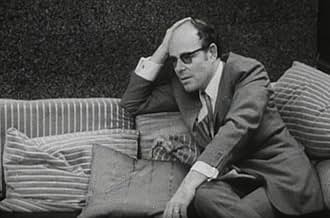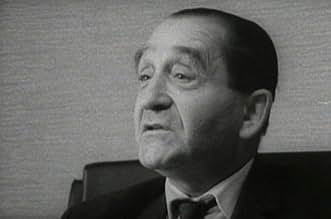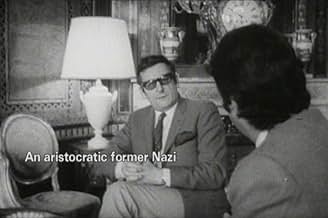अपनी भाषा में प्लॉट जोड़ेंAn in-depth exploration of the various reactions by the French people to the Vichy government's acceptance of the German invasion.An in-depth exploration of the various reactions by the French people to the Vichy government's acceptance of the German invasion.An in-depth exploration of the various reactions by the French people to the Vichy government's acceptance of the German invasion.
- 1 ऑस्कर के लिए नामांकित
- 6 जीत और कुल 2 नामांकन
- Self, former Wehrmacht Captain
- (as Helmuth Tausend)
- Self, general in the Wehrmacht
- (आर्काइव फ़ूटेज)
- (as General Stummel)
- Self, SS commander
- (आर्काइव फ़ूटेज)
- (as Zepp Dietrich)
- Self
- (आर्काइव फ़ूटेज)
- Self
- (आर्काइव फ़ूटेज)
- self, Former Mayor Of Combronde
- (as Monsieur Leiris)
- Self
- (आर्काइव फ़ूटेज)
फ़ीचर्ड समीक्षाएं
Thirty years down the road, Ophüls' methodology is as interesting as the history he tells. Merely claiming that Ophüls had an argument seems to work against the surface of his film, for he disguises his point of view, his argument, behind the reminiscing of his interview subjects. The film is a classic of humanist culture in large part because Ophüls, in giving the people the chance to say their piece, apparently puts his faith in those people (and in the audience that watches them) to impart "truth." However, the filmmaker is much cannier than this; he is not artless. The editing of the various perspectives in the movie allows the viewer to form conclusions of their own that don't always match those of the people who are doing the talking in the film. In fact, The Sorrow and the Pity makes great demands on the viewer, not just because of the film's length: Ophüls assumes you are processing the information he's providing, and so the film gets better as it progresses, with the viewer's attention being rewarded in direct correlation with the effort you put in.
And Ophüls is himself the primary interviewer in the film; you don't often actually see him, but he's there, asking the questions, leading on his subjects and his audience, only partly hidden (visually and philosophically) from view. The movie might look easy; there are none of the showy flourishes of a Kubrick or Stone here (or of Max Ophüls, for that matter). But the viewer is advised to remember that Ophüls' guiding hand is always in the background, constructing the film's version of the truth just as the characters do in their stories.
The documentary selects a few dozen people to interview - virtually all with different roles and attitudes during the Occupation. I found particularly interesting:
the French doctor with "7.5 children" (?) who was concerned primarily with feeding his family throughout the Occupation and was thrilled when hunting began after a two year moratorium,
the champion bicyclist who began against great competition in 1943 because of the number of French riding bicycles due to the absence of gas to run their motorbikes or cars (and who said he didn't see many Germans around Clermont-Ferrand in Vichy France)
the extraordinarily gentlemanly and rather shy-seeming Resistance chief who refused to cooperate with the Communists in his ferocious anti-Nazi work,
the British transvestite singer who became a secret agent for the British in occupied France and broke up with his German soldier lover for fear of compromising him,
Anthony Eden's extraordinary tact and intelligence,
Pierre Mendes-France's wonderful restraint, objectivity, humor and
absence of recrimination,
the German father of the bride at a wedding reception whose attitude toward his (undoubtedly brave) service in the War is wholly uncolored by the fact that the country for which he fought was the aggressor, totalitarian, and vigorously persecutor of groups - (I actually suspect that if one were merely a soldier and had not personally acted dishonorably in the War, this is the attitude that most would have -whether a German or Russian soldier - despite extending one's own horrible system into the rest of Europe).
For one, such as myself, who does believe the Communist Party, especially in those days of Stalin, to have been as great a menace to the world as the Nazi Party, the documentary's failure to ever ask the Communist officials interviewed about their beliefs about substituting one horror for another is disappointing. I could not forget as I watched the interviews of Communists, the 14.5 million recently killed by the Russians in Ukraine as the result of the terror famine imposed on that region - or the Great Terror that killed more millions and concluded just as the War began. In fact, M. Ophuls discomfits the Resistance leader who defied Orders from the Free French in London to cooperate with the Communists against the Nazis - I felt like applauding his behavior!
I'm sure for most, the most fascinating character is M. de la Maziere, the extraordinarily candid, intelligent, disarming and charming aristocrat and former Fascist youth who, at the end of the War, volunteered to serve on the Eastern Front in the German Waffen S.S. - from which only 300 of the 5000 survived. He was quite remarkable to hear - he'd obviously spent a great deal of time thinking about what he had done, why, and although regretful, was unsparing in his description of what he knew and what he had done. However, in interviewing him in a German castle used between the Wars by the Kaiser, and in 1944 for Petain and Laval, the documentary makes it appear as if the castle somehow relates to de la Maziere - as if he owned it - when in fact Ophuls simply took him there for the interview. It's the one dishonest seeming moment in this wonderful documentary.
I strongly recommmend that others see it - you will wonder how you would react, and think about what those in your own country would react to foreign occupation.
Focusing on the town of Clermont-Ferrand, Ophüls tries to understand what it was to live with German soldiers in your town, an optimistic and collaborating government, an exiled general urging you to resist and underground organizations who used terrorism as their only weapon. Ophüls does not multiply the number of interviewees. He chooses about 15 of them and interviews them long enough that you understand their comments within the context of their personality and outlook. But the most surprising is the variety among the interviewees: a very courageous farmer, a reckless British spy, a British minister, a self-sufficient German general, a doubting German soldier, a chauvinistic bourgeois, a young nobleman attracted by the Nazi theories, a young disillusioned nobleman-philosopher ready to sacrifice his life, a clear-sighted Jewish government representative, a naïve woman, a Communist, a nationalist. You'll be surprised to find out who is the most perceptive of the bunch
क्या आपको पता है
- ट्रिवियाOriginally intended for French television. However, French broadcasters refused to show it arguing the documentary depicted occupied France as exclusively populated by traitors.
- भाव
Dr. Claude Levy: France is the only government in all Europe whose government collaborated. Others signed an armistice or surrendered, but France was the only country to have collaborated and voted laws which were even more racist than the Nuremberg laws, as the French racist criteria were even more demanding than the German racist criteria. It's not something to be proud of.
- कनेक्शनFeatured in Annie Hall (1977)
- साउंडट्रैकÇa Fait d'Excellents Français
Music by Georges Van Parys
Lyrics by Jean Boyer
Performed by Maurice Chevalier
टॉप पसंद
- How long is The Sorrow and the Pity?Alexa द्वारा संचालित
विवरण
- रिलीज़ की तारीख़
- कंट्री ऑफ़ ओरिजिन
- आधिकारिक साइट
- भाषा
- इस रूप में भी जाना जाता है
- The Sorrow and the Pity
- फ़िल्माने की जगहें
- Clermont-Ferrand, Puy-de-Dôme, फ़्रांस(Main location)
- उत्पादन कंपनियां
- IMDbPro पर और कंपनी क्रेडिट देखें
बॉक्स ऑफ़िस
- US और कनाडा में सकल
- $13,082
- US और कनाडा में पहले सप्ताह में कुल कमाई
- $5,224
- 26 फ़र॰ 2023
- दुनिया भर में सकल
- $13,082
- चलने की अवधि4 घंटे 11 मिनट
- रंग
- ध्वनि मिश्रण
इस पेज में योगदान दें




























